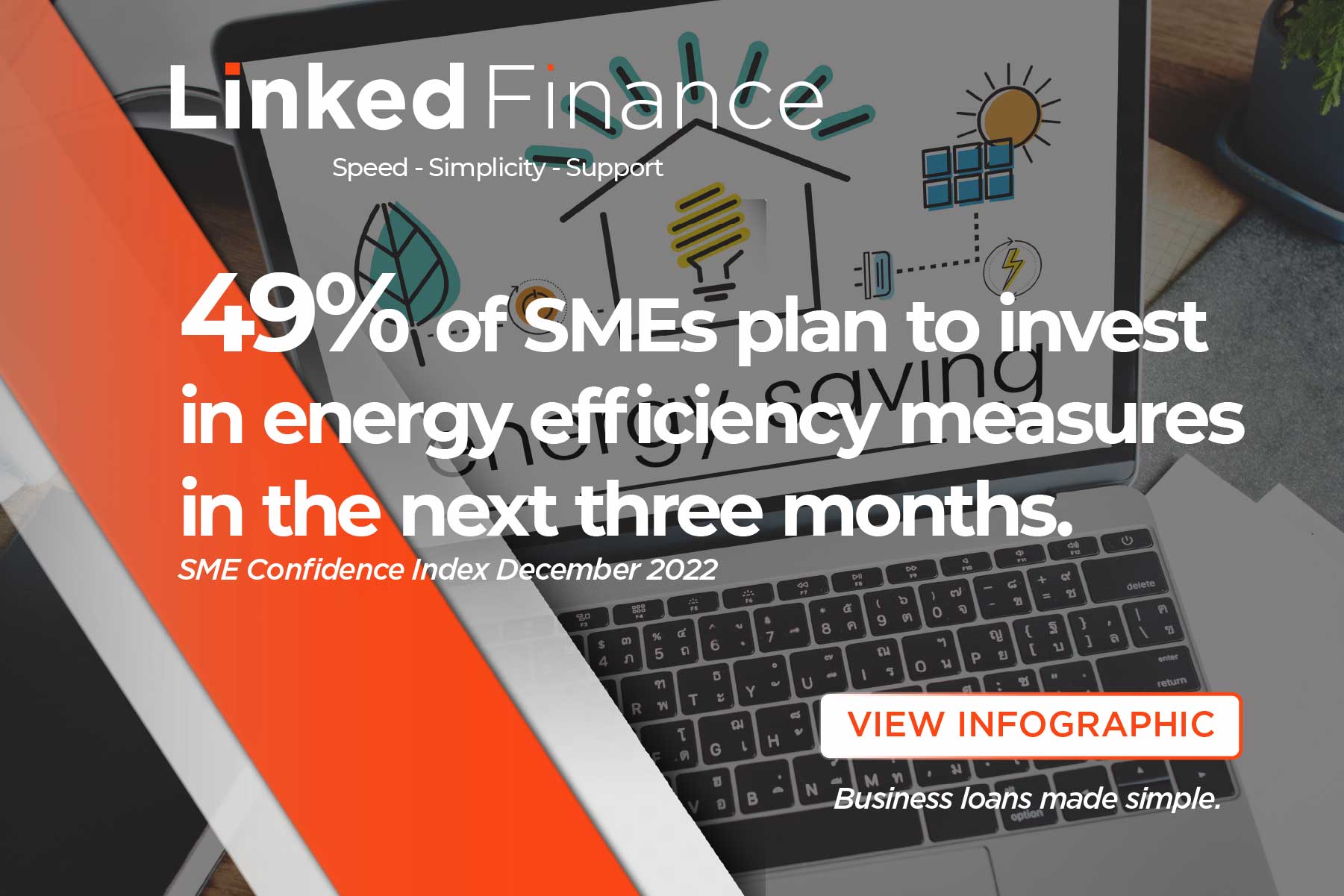SME optimism stalls as businesses pass on higher costs to combat inflationary pressures.
Business Optimism Index dips slightly due to economic challenges, but remains positive at 60
41% of companies charging higher prices in Q3 2022 as October inflation hit 9.2%
74% of businesses felt they performed better or in line with expectations in the third quarter of the year
49% of businesses plan to invest in energy efficiency or upgrade measures in the next 3 months
Business Optimism Q3
Overall business optimism dipped amongst Irish SMEs in the third quarter of the year but still remains positive, according to the latest Linked Finance SME Confidence Index, based on research conducted by Behaviours & Attitudes.
The Business Optimism Index score came in at 59.7 (out of 100) in Q3 2022, down from 61.6 in Q2 2022. The decline in business sentiment in the SME sector was particularly notable in the micro-SME sector, where business optimism has dropped to 57.1.
Inflationary pressures are forcing businesses to pass on higher costs to consumers, as 41% of companies indicate charging higher prices in Q3 2022, an increase from 39% of respondents in Q2 2022, and up from 30% in Q3 2021. Despite charging higher prices, 68% reported same or lower profitability compared to quarter 3 in 2021.
The most recent CSO consumer price index for October showed an inflation rate of 9.2% with energy prices the main driver of inflation in Ireland. The findings indicate SMEs are focused on energy reduction as energy prices are estimated to have increased by 13.6% in October and are up 47.6% compared to a year ago.1
On a positive note, 74% of businesses felt they performed better or in line with expectations in the third quarter of the year. A total of 36% cited performance as better or much better than expected, 38% said business was the same, while 25% of SMEs say performance is worse than expected. Looking out to the last quarter of this year, 73% expect business activity to be higher or the same as the fourth quarter of last year, despite wider economic challenges.
However, the uncertain economic landscape appears to be hitting the rate of business growth. Responses show that 36% of firms in Q3 cited higher business activity compared to the previous year. This was down significantly compared to the same period last year when 51% of businesses expected to see higher activity. This data indicates a slowdown in business confidence coming off the back of a period of sharply accelerated activity following the reopening of the economy post-pandemic.
Rising Energy Costs
In tackling rising input costs, more than one in three Irish SMEs are planning to invest in energy efficiency measures to help combat rising energy costs in the next 12 months. The latest findings show that 35% of businesses plan to invest in energy efficiency or upgrade measures in the next 12 months to relieve the pressure of spiralling energy costs. Of those planning to invest, about 52% of micro-SMEs (those with 1-3 employees) and 38% of larger SMEs (those with 10+ employees) are planning to make these energy efficiency upgrades in the next three months – signalling the need for immediate action to reduce energy costs.
It comes as the European Commission approved the Temporary Business Energy Support Scheme (TBESS), aimed to assist businesses with their energy costs during the winter months. Qualifying businesses can claim 40% of the increases in their energy bills under the €1.2 billion scheme.2
Linked Finance CEO Niall O’Grady said that the alternative lender has already seen an increase in the number of companies borrowing for quick finance to invest in energy upgrades to combat their rising energy bills. Those seeking loans to proactively address rising energy costs in recent weeks include a seafood business investing in Hydro Turbines to generate its own electricity, a retailer investing in Solar PV panels and a business buying its own generator to guarantee the security of supply.
Similar to previous results, the latest Index findings suggest the recovery is coming slower to micro-SMEs. These businesses report the lowest level of increase in operational profits compared to peers. Some 25% of micro-SMEs report higher profits, compared to 36% for transitional SMEs (4 to 9 employees) and 53% for mid/large SMEs (10+ employees). Micro businesses also report significantly lower future optimism, with just 31% anticipating a higher performance in Q4 versus 44% for mid/large SMEs.
From a sectoral perspective, the Retail & Wholesale sector is grappling with the impact of wider inflationary challenges, which is creating a ripple effect as 43% citing lower business activity in Q3 2022. They expect this trend to continue into Q4 2022, with 31% of businesses expecting lower business activity to year-end. This is also reflected in the Business Optimism score, which dropped from 65.9 in Q3 2021 to 55.58 in Q3 2022.
Niall O’Grady, CEO of Linked Finance, said:
“As inflationary pressures hit businesses with an increase in input costs in areas such as materials, rent, and food, it is the rise in energy costs that is proving the real pinch-point. To address climbing energy bills, SMEs are taking a proactive approach by improving their energy efficiency. A secondary consideration is also energy storage and security of supply. The Government recently opened the Temporary Business Energy Support Scheme to support businesses and create some relief. At Linked Finance, we have already seen a notable increase in the number of businesses borrowing via the platform to address energy concerns including backup generators, solar panels installations, and hydro turbines.
As we’ve seen with other economic challenges, Irish SMEs are demonstrating a strong ability to be agile and dynamic to weather the current storm. Businesses are looking to get ahead of rising costs, and this has resulted in a positive outlook for the rest of the year”.


